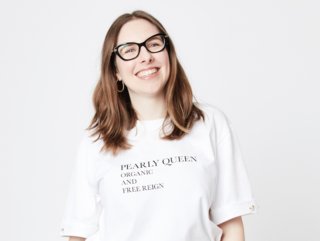Lucy Kebbell, creating better, sustainable businesses

With a clear passion for sustainability, Lucy Kebbell founded The WIP to create a supportive community for small businesses that all share the same mission. We sat down with Lucy to discover more about The WIP, as well as what it’s like to be a start-up owner.
Hi Lucy, tell me about yourself and The WIP
I’m a former fashion stylist turned writer and sustainability advocate, based in South East London. At the beginning of this year, I launched The WIP, a digital membership platform to support the small, sustainable businesses that I have worked with for the past few years. We provide a supportive community and learning resources in a flexible and accessible way. We’re also proud to have launched as a net zero company and we try to ensure all of our business is as low impact as possible. I have a vision for The WIP to become the next LinkedIn but with a focus on better, sustainable businesses.
How does The WIP support small businesses?
We offer a monthly membership that provides a supportive community of like-minded entrepreneurs and small business founders working in the sustainability space. Through sharing experiences, problems and resources, our members are growing their businesses in a way that suits their values. We also offer virtual events like panel discussions and workshops to provide members opportunities to learn from experts in sustainability for a reasonable price. This also includes resources like templates, articles, workshops and beginners guides.
Why is sustainability important to you and your business?
I’ve long been aware of the climate crisis and so when I came up with the idea of The WIP, I knew I would only do it if I could tread as lightly on the Earth as possible. When I discovered tangible ways to limit the environmental impact of my own business I felt empowered and wanted to share this message. We are currently using resources equivalent to 1.75 Earths, and very soon, we will run out. I believe all businesses should be lowering their impact, and improving communities and the environment by using better business practices.
What have your most significant career achievements been?
Successfully raising our goal amount in 30 days for our Kickstarter campaign in August 2021 was a big highlight for me. It was something I never imagined myself doing, so the feeling I got when I applied myself to such a big task and succeeded was amazing. I also count quitting my full-time job to throw myself into learning more about sustainability as a big achievement. It was so scary at the time, but I am thankful that I have a great support system that could see how unfulfilled I was and helped me find the strength to take such a big risk.
Likewise, what have been your greatest challenges?
The Kickstarter campaign was a huge challenge. It really took me out of my comfort zone. As someone who hates asking for things, I had to really adopt a ‘hustler’ mindset but the thought of working so hard and not achieving our goal was so scary that I applied myself to the task. It was exhausting and I had to juggle a few weeks of no childcare too, but it was really worth it. Building The WIP was also a big challenge as I had no idea what was involved in starting a tech company and growing a community. Every day I learn something new, which I love, but it’s definitely not the easiest job I’ve ever done. As a business owner, I have to learn how to do everything and not everything comes easy to me.
What would you say to young girls to encourage them to pursue a career path tackling environmental issues?
I recently learnt that women are more likely than men to meaningfully pursue climate issues, and that companies with women in senior positions are far more eco and ethically aware than those led by men. It can be an intimidating space, everyone has an opinion and the science can sometimes be difficult but we need more women to be part of this to enact real change. This issue isn’t just environmental, it’s also social, and women are great at understanding and running social impact businesses. We should have more options available for women to start social enterprises and charities that help communities.
What would you say has been the secret to your success?
I’m an optimist, my glass is always half full and I bring that to everything I do. It’s not always easy, but I’ve found that a positive mindset and a passion for changing business for the better has driven me forward whenever I have felt defeated. I’m also a chatty people person, which helps when building a community and I quickly learnt that once I leaned into my authentic self and stopped worrying about appearing professional, things became so much easier.






